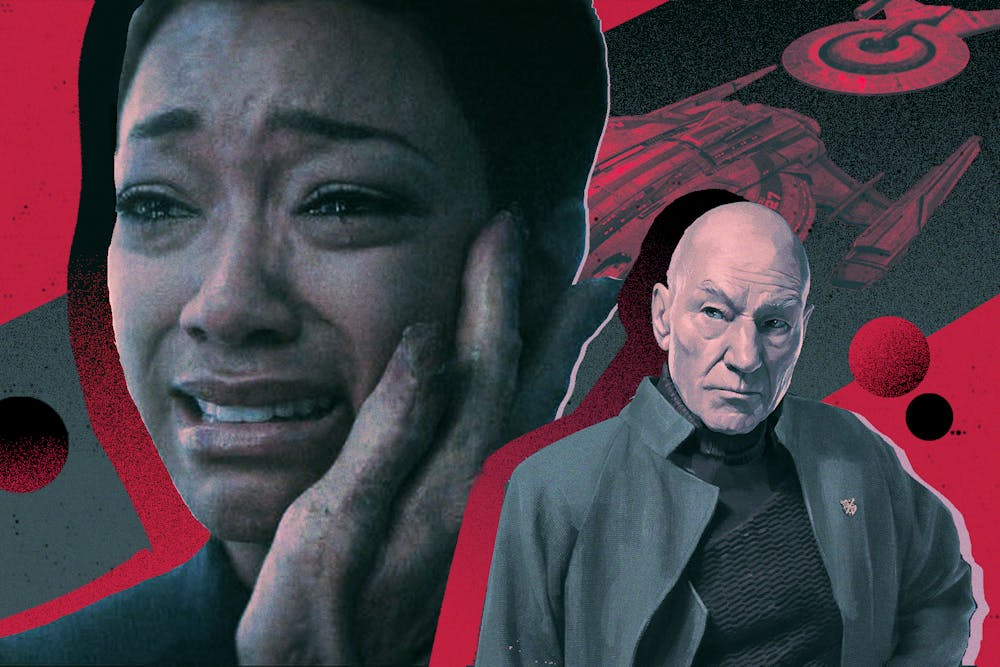“I can’t do it anymore. I’m sorry, I tried.”
This is a statement delivered at the end of a long–term relationship, one that’s gradually grown strenuous and tense. One partner’s steadfast devotion and extreme patience has been met with repeated issues and ignorance of the problems at hand. It just so happens, however, that the relationship here is the one between the Star Trek franchise’s most loyal fans and its current flagship show, Star Trek: Discovery. This quote comes from a post on the subreddit r/StarTrekDiscovery, which is one of many forums viewers of the show use to discuss complex fan theories, share show–related news, and comment on new episodes as they're released.
Like many Trek forums, r/StarTrekDiscovery has a rule against posting rants about the show, aimed at encouraging legitimate discourse rather than angry arguments. Over the 56–year history of the show, fans have developed strong, emotional opinions, and baseless rants have been somewhat common. With each new television show, there have been complaints, ranging from alarm over Patrick Stewart’s Captain Picard on Star Trek: The Next Generation (TNG) being “not Captain Kirk” to prejudiced rants about sitting a woman or Black man in the captain’s chair on Star Trek: Voyager (VOY) or Star Trek: Deep Space Nine (DS9).
Such complaints have also existed regarding Discovery, as it’s pushed the franchise’s long–standing commitment to envisioning a diverse and inclusive future into a new era. However, there are legitimate grievances that need to be considered: Many are starting to lose patience with the show’s uninteresting storytelling and the fact that at the end of the day, Discovery just doesn’t feel like Star Trek.
Like Discovery, the long–running Trek shows of the 1990s had mixed reviews during their first couple of seasons. However, each series eventually found its unique way to incorporate the character–driven science fiction format that made the original series (TOS), Star Trek, so beloved. TOS’s triad of the charismatic Captain Kirk, logical Commander Spock, and impulsive Dr. McCoy served to create an interesting, if at times heavy–handed, contrast of responses during the tense military situations in which the characters often found themselves. TNG created a similarly dynamic ensemble, but focused more often on the moral and ethical quandaries of their space exploration, while VOY focused on two opposing groups banding together to return home from a distant quadrant of the galaxy. DS9 took the furthest leaps in format from the original: The show was set on a space station rather than a ship, it often stepped away from the episodic format, and eventually the plot revolved around a full–scale war. However, arguably, it also had the strongest ensemble and imbued its characters with impressive nuance that allowed for great involvement with the ongoing story.
These shows were far from perfect at their beginnings, but eventually found their footing and their niche in the Trek world. Even the prequel show Star Trek: Enterprise moved past its notorious first two seasons into one of the most interesting season–long arcs in Trek history. Discovery seems to be doing the opposite. The first season established a set of characters—rebellious Burnham, nervous Saru, fresh–faced Tilly, cunning Lorca, and pompous Stamets—all working together to test new space technology and prevent a war. The second engaged more complex personalities, like the Mirror Universe’s Emperor Georgiou and the doomed Captain Pike, as the crew explored a conspiracy involving time travel and artificial intelligence.
However, seasons three and four have barely been recognizable as the same show: The lead character, Michael Burnham, is constantly crying, whispering, or evading the consequences of her actions, storylines continuously focus on crises of confidence (Important as it is, self–care does not make for interesting television), and story development is at a minimum as characters serve repetitive, underdeveloped, inconsistent, or completely irrelevant functions that distract from the plot. The effect is a sense of aimlessness: Characters like Cleveland Booker consist solely of situational motivations, yet somehow large plot points feel completely distanced from most of the ensemble.
Were Discovery not so dramatically being elevated as the flagship show of the franchise, perhaps the situation wouldn’t be quite so frustrating. Star Trek: Picard has brought back old characters while also establishing memorable new ones, like Dr. Jurati or Captain Rios. Its first season’s arc about the policing of synthetic beings didn’t quite live up to the suspense that it generated, but it was generally exciting and well–received. Despite its satirical nature, Star Trek: Lower Decks, Trek’s first foray into the adult animation genre, has been more recognizable to many fans as classically 'Star Trek' than anything else.
Why is Discovery being heavily promoted when it is so obviously having an identity crisis? It wants to be a new type of Star Trek show, one which centers a few characters at the heart of a season–long science fiction storyline. But it hasn’t been able to grasp the feel of good Star Trek. Neither does it even really feel like bad Star Trek. Instead, it feels like bad Doctor Who, which isn’t needed, because Doctor Who is also very bad right now.
The writers of Discovery have all the tools they need to be successful: an interesting science fiction premise, new levels of VFX technology, and lots of great examples to learn from over the franchise’s long legacy. Whether they learn from Picard or even from ten–year–old Doctor Who, they have the opportunity to place the signature Star Trek touches on character–driven science fiction of which they can be proud.
The writers need to be creating strong characters—ones that the viewer knows won’t abandon ship. If they don’t, it’s Discovery that will be abandoned.

